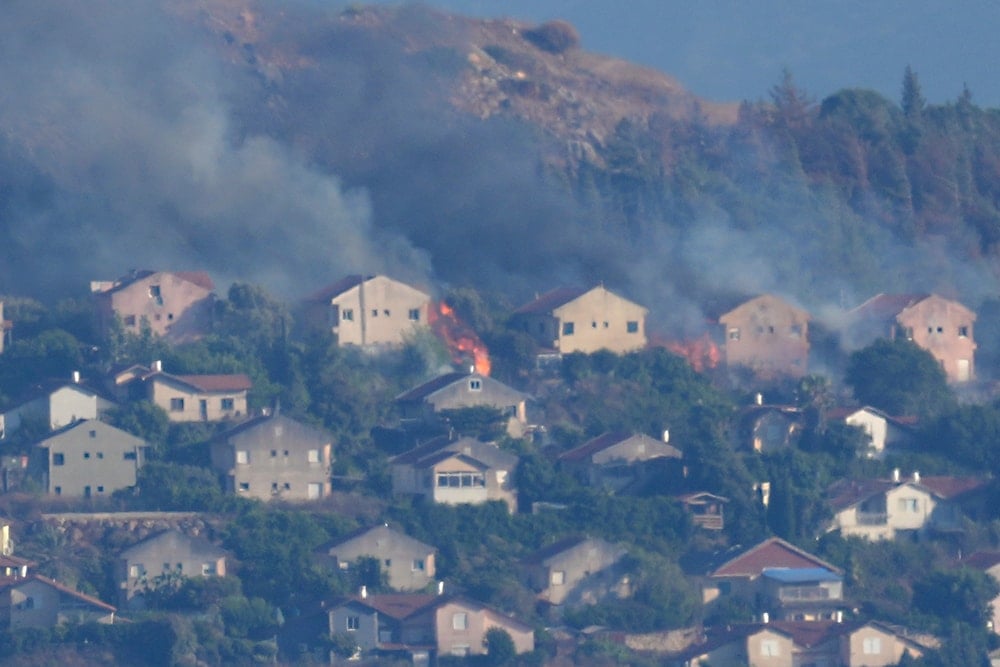Israeli settlers refuse to return to Metulla, 70% of houses destroyed
Settlers living in Metulla in northern occupied Palestine petitioned the Israeli Supreme Court for a conditional order and an urgent hearing to exclude the settlement from the return decision.
-

Fires and smoke rise at houses in the northern Israeli border town of Metula, hit by Hezbollah shelling, as seen from the Lebanese town of Marjayoun, Lebanon, on June 22, 2024. (AP)
Yair Kraus, the northern correspondent for Israeli newspaper Yedioth Ahronoth, reported that settlers in the settlement of Metulla filed a petition with the Supreme Court on Wednesday, and requested a conditional order and an urgent hearing to discuss their appeal for the settlement's exclusion from the return decision.
He stated that the settlement council, led by David Azoulay, argued in its petition that the government’s refusal to exempt Metulla from the return decision had led to a “completely unreasonable” outcome.
The petition emphasized that residents would be forced to abandon their current houses, workplaces, and schools to return immediately, despite 70% of the settlement's houses being damaged and Metulla being unprepared to accommodate them. It also highlighted the ongoing significant security risks in the area.
According to the newspaper, the settlers criticized the government's decision to mandate their return despite the widespread destruction of houses and public infrastructure. They even urged Supreme Court justices to visit Metulla, assess the situation firsthand, and recognize that the decision is unreasonable, as the settlement is currently unfit for habitation.
Kraus confirmed that Metulla was targeted by more than 2,200 rockets, mortars, and missiles during the war. In their petition, the local council highlighted the dire conditions, emphasizing that most residents lack shelter, fortified rooms, or any form of protection.
Read next: North is far from healed, despite end of war: Israeli media
He also noted that large parts of the settlement were destroyed during the war, educational institutions were unfit to accommodate students, and healthcare facilities remained closed.
He added, "For this reason, it was stated that the current situation in Metulla does not allow for commercial activities, tourism (as all hotels and dozens of guest houses were damaged), agriculture, community life, welfare, health services, and more."
Israel Hayom also acknowledged that the Israeli government faces a real dilemma in returning settlers to northern settlements. It noted that the main issue is the lack of a sense of security, as their consciousness remains "seared by the bitter memory of the war," leaving them fearful that history could repeat itself.
According to the daily, the settlers of the north are facing fundamental issues beyond the security dilemma - the widespread destruction of their settlements. Additionally, economic and social challenges hindered the return to normal life, especially due to what is described as "negative migrations" and the disruptions to the "educational process."
Israeli settlers yet to reel in from war: Settlement chief
On a similar note, Israeli media reported Wednesday growing frustration among settlers of northern settlements, particularly in Nahariya, where locals say they have yet to recover from the previous round of hostilities and are calling for stronger economic support.
David Azulai, head of the Metulla settlement council, criticized Israeli Prime Minister Benjamin Netanyahu for neglecting the concerns of northern settlers. "He doesn’t come to us, he doesn’t talk to us. The cabinet doesn’t talk to us, and the Israeli army communicates with us only minimally," Azulai said.
Speaking to Channel 12, Azulai warned of potential escalations, stating, "No one is deceiving us; October 7 in the north will happen at a time of Hezbollah’s choosing."
Azulai pointed to ongoing security threats, particularly from anti-tank missiles, which he stressed the Israeli occupation forces have yet to neutralize.
"They said they would bring residents back to the North safely, but there is no safe return. No one is deceiving us; another October 7 will happen in the North, whether in a year or two. The agreement is not good," he stated.

 4 Min Read
4 Min Read








